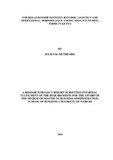| dc.contributor.author | Muthemba, Julius M | |
| dc.date.accessioned | 2017-01-09T04:43:56Z | |
| dc.date.available | 2017-01-09T04:43:56Z | |
| dc.date.issued | 2016 | |
| dc.identifier.uri | http://hdl.handle.net/11295/99718 | |
| dc.description.abstract | This study aimed to postulate the relationship of reverse logistics and operational performance of the manufacturing firms in Kenya. This study was anchored on three organizational theories that were examined to understand how companies adopt and develop reverse logistic practices. The three theories were resource advantage, dynamic capabilities and stakeholder theories. This study used descriptive and cross-sectional survey design. This study employed proportionate stratified random sampling technique. Data for this study was obtained from primary sources. The principal data was collected through organized questionnaire. Regression modelling was used to estimate the relationship between reverse logistics and operational performance. Study results revealed that third party logistics significantly and positively influenced cost in the manufacturing firms (β = 0.6124; p < 0.05). The study however established that both joint venture (β = -0.0706; p > 0.05) and closed loop (β = -0.1772; p > 0.05) did not have significant effect on cost. Joint ventures in the logistics firms positively and significantly influenced quality in the logistic firms (β = 0.7745; p < 0.05) while closed loop (β = -0.2310; p > 0.05) and third party logistics (β = -0.0731; p > 0.05) did not have significant effect on quality. Closed loop in the manufacturing firms positively and significantly influenced delivery speed (β = 0.5816; p < 0.05) while both joint venture (β = -0.0391; p > 0.05) and third party logistics (β = 0.1059; p > 0.05) did not have significant effect on delivery speed. Joint ventures (β = 0.3989; p < 0.05) and third party logistics (β = 0.2872; p < 0.05) positively and significantly influenced flexibility while closed loop did not have a significant effect on flexibility (β = -0.0960; p > 0.05). This study therefore recommended adoption of reverse logistics in a more formal manner with laid out policy guidelines as it has been well noted that reverse logistics adoption has positive relationship with the enhancement of operational performance measures of the manufacturing firms. Further stakeholder awareness on reverse logistics models needs to be enhanced as more of the respondents seemed not to appreciate other cost effective models of reverse logistics such as joint ventures and third party logistics (3PL). | en_US |
| dc.language.iso | en | en_US |
| dc.publisher | University of Nairobi | en_US |
| dc.rights | Attribution-NonCommercial-NoDerivs 3.0 United States | * |
| dc.rights.uri | http://creativecommons.org/licenses/by-nc-nd/3.0/us/ | * |
| dc.subject | Reverse logistics and operational performance | en_US |
| dc.title | The relationship between reverse logistics and operational performance among manufacturing firms in kenya | en_US |
| dc.type | Thesis | en_US |



